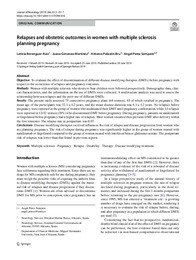Por favor, use este identificador para citar o enlazar este ítem:
https://hdl.handle.net/11000/30560Registro completo de metadatos
| Campo DC | Valor | Lengua/Idioma |
|---|---|---|
| dc.contributor.author | Berenguer Ruiz, Leticia | - |
| dc.contributor.author | Gimenez‑Martinez, Juana | - |
| dc.contributor.author | Palazón-Bru, Antonio | - |
| dc.contributor.author | Perez-Sempere, Angel | - |
| dc.contributor.other | Departamentos de la UMH::Medicina Clínica | es_ES |
| dc.date.accessioned | 2024-01-22T17:57:11Z | - |
| dc.date.available | 2024-01-22T17:57:11Z | - |
| dc.date.created | 2019-06 | - |
| dc.identifier.citation | Journal of Neurology Volume 266, (2019) | es_ES |
| dc.identifier.issn | 1432-1459 | - |
| dc.identifier.issn | 0340-5354 | - |
| dc.identifier.uri | https://hdl.handle.net/11000/30560 | - |
| dc.description.abstract | Abstract Objective To evaluate the effect of discontinuation of different disease-modifying therapies (DMTs) before pregnancy with respect to the occurrence of relapses and pregnancy outcomes. Methods Women with multiple sclerosis who desire to bear children were followed prospectively. Demographic data, clinical characteristics, and the information on the use of DMTs were collected. A multivariate analysis was used to assess the relationship between relapses and the prior use of different DMTs. Results The present study assessed 75 consecutive pregnancy plans (66 women), 65 of which resulted in pregnancy. The mean age of the participants was 32.1 ± 4.2 years, and the mean disease duration was 6.1 ± 4.2 years. No relapses before pregnancy were reported in the group of women who maintained their DMT until pregnancy confirmation, while 14 relapses were reported in 12/42 women (29%) who discontinued DMT before pregnancy. During pregnancy, patients on natalizumab or fingolimod before pregnancy had a higher rate of relapses. Most women restarted their previous DMT after delivery within the first trimester. The relapse rate in postpartum was 0.07. Conclusions Disease-modifying therapies received influences the risk of relapse and disease progression from women who are planning pregnancy. The risk of relapse during pregnancy was significantly higher in the group of women treated with natalizumab or fingolimod compared to the group of women treated with interferon beta or glatiramer acetate. The postpartum risk of relapses was lower than that found in previous reports. | es_ES |
| dc.format | application/pdf | es_ES |
| dc.format.extent | 6 | es_ES |
| dc.language.iso | eng | es_ES |
| dc.publisher | Springer | es_ES |
| dc.rights | info:eu-repo/semantics/openAccess | es_ES |
| dc.rights | Attribution-NonCommercial-NoDerivatives 4.0 Internacional | * |
| dc.rights.uri | http://creativecommons.org/licenses/by-nc-nd/4.0/ | * |
| dc.subject | Multiple sclerosis | es_ES |
| dc.subject | Pregnancy | es_ES |
| dc.subject | Relapse | es_ES |
| dc.subject | Disability | es_ES |
| dc.subject | Therapy | es_ES |
| dc.subject | Disease-modifying treatment | es_ES |
| dc.subject.other | CDU::6 - Ciencias aplicadas::61 - Medicina | es_ES |
| dc.title | Relapses and obstetric outcomes in women with multiple sclerosis planning pregnancy | es_ES |
| dc.type | info:eu-repo/semantics/article | es_ES |
| dc.relation.publisherversion | https://doi.org/10.1007/s00415-019-09450-6 | es_ES |

Ver/Abrir:
13-RelapsesAndObstetricOutcomes (1) (1).pdf
644,38 kB
Adobe PDF
Compartir:
 La licencia se describe como: Atribución-NonComercial-NoDerivada 4.0 Internacional.
La licencia se describe como: Atribución-NonComercial-NoDerivada 4.0 Internacional.
.png)